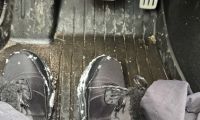Knock, knock, is anyone at VW home? Is anyone listening? Is Volkswagen even listening to itself? VW has now flipped the script and has gone on a massive denial binge. It has put its automaking foot down, like a little kid in a tantrum, and is saying it is not cheating because no laws have been broken.
Dieselgate Scandal Background
As background, the Dieselgate scandal was precipitated when Volkswagen’s engineering staff turned to fraud because the EA-189, 2.0-liter diesel four they were developing would not meet U.S. standards for nitrous oxide emissions in 2006. It was a conscious decision. They had rejected the idea of urea formaldehyde doping, the control method that was reportedly set for that powerplant because it would have had to have been licensed from Mercedes-Benz. So, the engine, they decided, would be dirty. They would only try to make the motor seem clean.
This move came after engineers attempted to use reburn technology. Reburn was not a particularly fruitful tool to use – it was used extensively in the late 1970s with no significant success. The industry turned to catalytic converters because to make things work and clean gasoline emissions.
Finding the fix unworkable, VW’s engineers then settled a software workaround that made it seem as if a vehicle was clean when it wasn’t. Specifically, the software – the fabled software defeat switch -- would turn the emission system on when a vehicle was in test mode and off when the testing was completed. Implemented in secret, for six years they carried the deception out until a group of independent researchers found the hack. The researchers did tell VW about it, and the carmaker tried another ineffectual fix. When that fix didn’t work, they went back to business as usual. The only problem is that the Environmental Protection Agency (EPA) and the California Air Resource Board (CARB) found out about the scam quite quickly, as things worked out. Next, VW admitted the cheating, and a Notice of Violation went to VW. The rest, as they say, is history.
Now, fast-forward to 2016 and last month’s decision settling the civil portion of Dieselgate. VW is now on the hook for $10 billion it owes to owners of 475,000 diesels with rigged emissions systems; it owes $4.7 billion to funds that will either mitigate the effects of the emissions or will be used to build a zero-emissions infrastructure, and funds are included for the dealer and state compensation. It took some tough negotiation to reach an accommodation.
You have to wonder why, based on its U.S. experience, the automaker would think that stiffening its position in Europe would work any better than it did in the U.S. However, that is exactly the tack it is taking in Germany, where most of the diesel cars touched by Dieselgate are registered. The European Commission has been pressuring VW to make accommodations similar to those it made in the U.S. And a Spanish court has ruled against the automaker and for a consumer.
Volkswagen has decided to play hardball, arguing that the technology is legal; it complies with the rules of the European Union. VW claimed that “the software contained in vehicles with [an] EA -189 engine, in the view of Volkswagen, represents no unlawful defeat device under European law.”
Wrong Gambit, Wrong Time
It seems to be a huge gamble for the automaker. VW, stepping back into denial mode, now says that the “efficiency of the emissions cleanup system will not be reduced in those vehicles …” It further implied, in a statement, that since it believed the efficiency of the cleanup system won’t be impaired, “which … would be a prerequisite” to prove “ the existence of an unlawful defeat device in the legal sense” the bogus software was quite legal.
The automaker doesn’t seem to be taking any chances that authorities might force its hand. VW is still following orders from the Transport Ministry (KBA) by continuing what it considers is a goodwill refit of the vehicles affected by the automaker’s self-inflicted emissions scandal. “VW wants to – in the special interest of customers – cooperate constructively and cooperatively hand in hand with the regulators as well as with the” KBA. “This intensive cooperation should not be burdened by a contentious dispute (the interpretation as to whether the defeat switch is the problem),” the automaker averred in an email. VW also argued whether a link between NOx emissions and harmed health had been proven.
Sources: Automotive News, Reuters, NDR, WDR, Sueddeutsche Zeitung
Set as google preferred source












Comments
This is a very well written
Permalink
This is a very well written explication of a very complex conundrum. Well worth a read.